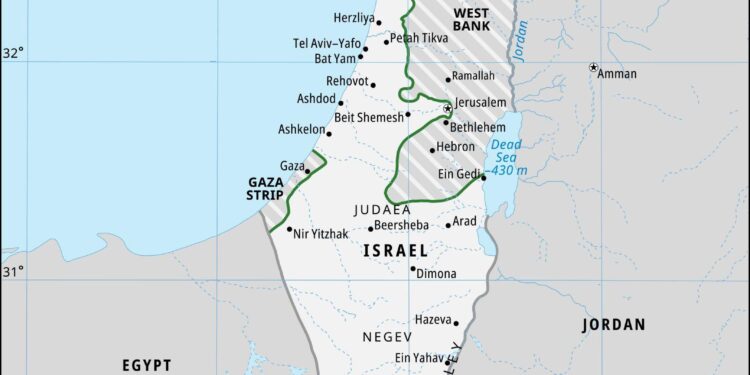Labour Party leader Keir Starmer has announced that the United Kingdom will recognize a Palestinian state unless Israel agrees to implement a ceasefire in Gaza. Speaking amid escalating tensions and ongoing conflict in the region, Starmer’s statement marks a significant shift in the UK’s stance and adds pressure on the Israeli government to halt military operations. This development comes as international calls for de-escalation intensify, highlighting the growing urgency for a negotiated resolution to the violence.
Starmer Issues Ultimatum to Israel Linking Recognition of Palestinian State to Gaza Ceasefire
Labour leader Keir Starmer has delivered a stark warning to the Israeli government, emphasizing that the United Kingdom is prepared to recognize a Palestinian state if a ceasefire in Gaza is not swiftly agreed upon. Addressing the urgency of the conflict, Starmer stressed that the continuation of hostilities only hampers prospects for peace and threatens regional stability. His statement comes amid mounting international pressure to halt violence and facilitate humanitarian aid access in the embattled Gaza Strip.
Starmer outlined key conditions for the UK’s recognition stance, including:
- Imposition of an immediate and sustained ceasefire in Gaza
- Commitments to protect civilian lives and infrastructure
- Reopening of humanitarian corridors for essential supplies
This ultimatum signals a significant shift in UK foreign policy, reflecting growing frustrations with the ongoing conflict and a more assertive approach to supporting Palestinian statehood as a means to encourage lasting peace.
| Condition | Expected Outcome |
|---|---|
| Gaza Ceasefire | Immediate halt to violence |
| Protection of Civilians | Reduction in casualties |
| Humanitarian Access | Delivery of aid and essentials |
Implications for UK Foreign Policy Amid Rising Middle East Tensions
The UK’s foreign policy landscape faces a critical juncture as Middle East tensions escalate. Starmer’s readiness to recognize a Palestinian state pending an Israeli ceasefire signals a strategic shift that could recalibrate Britain’s diplomatic relations in the region. This move underscores a growing pressure within UK political circles to adopt a more balanced stance amidst ongoing conflict, potentially challenging longstanding alliances and raising questions about future cooperation with Israel. The decision also reflects increasing domestic and international calls for the UK to play a more assertive role in pursuing peace and upholding international law.
Key implications for British foreign policy include:
- Diplomatic Realignment: A formal recognition of Palestine could prompt a reassessment of ties with key Middle Eastern partners and reshape Britain’s influence within international forums like the UN.
- Security and Intelligence Cooperation: The UK may need to navigate complex intelligence-sharing dynamics, balancing counterterrorism priorities with emerging political sensitivities.
- Economic Considerations: Trade agreements and defense contracts with regional actors may undergo scrutiny as the UK balances ethical concerns and geopolitical interests.
| Foreign Policy Factor | Potential Impact | Timeframe |
|---|---|---|
| Middle East Alliances | Realignment of diplomatic ties | 6-12 months |
| International Reputation | Enhanced image as a peace broker | Immediate to short term |
| Security Collaboration | Possible strain in intelligence sharing | Ongoing |
Experts Urge Diplomatic Engagement and Multilateral Efforts to De-escalate Conflict
Leading international figures emphasize the urgent need for renewed diplomatic dialogue and expanded multilateral cooperation to ease tensions in the region. They warn that without immediate, coordinated engagement, the risk of prolonged violence and regional instability could escalate dramatically. Experts highlight the importance of sustained communication channels between conflicting parties and advocate for inclusive peace talks that involve all stakeholders, including neighboring states and influential global actors.
Key strategies proposed include:
- Revitalizing ceasefire negotiations: Ensuring all sides commit to halting hostilities and creating space for dialogue.
- Strengthening international mediation efforts: United Nations and regional coalitions stepping up to facilitate agreements.
- Providing humanitarian support: Addressing urgent civilian needs to build trust and reduce suffering.
- Promoting long-term political solutions: Focusing beyond immediate crises to sustainable peace frameworks.
| Effort | Lead Participants | Expected Outcome | |||||||||||||
|---|---|---|---|---|---|---|---|---|---|---|---|---|---|---|---|
| Ceasefire Agreement | Israel, Palestinian Authorities, UN | Immediate reduction of violence | |||||||||||||
| Humanitarian Access | International NGOs, Red Cross | Aid for civilians in Gaza | |||||||||||||
| Multi-state Mediation |
| Effort | Lead Participants | Expected Outcome |
|---|---|---|
| Ceasefire Agreement | Israel, Palestinian Authorities, UN | Immediate reduction of violence |
| Humanitarian Access | International NGOs, Red Cross | Aid for civilians in Gaza |
| Multi-state Mediation | UN, Egypt, Qatar, EU | Facilitation of lasting political dialogue |
| Long-term Peacebuilding | International Community, Local Leaders | Sustainable political frameworks and reconciliation |
If you want, I can help you format this further or provide a summary or analysis based on the content you shared. Just let me know!
Concluding Remarks
As the UK government weighs its position amid escalating violence in Gaza, Labour leader Keir Starmer’s stance signals a potential shift in British foreign policy. By linking recognition of a Palestinian state to an Israeli ceasefire, Starmer underscores growing international pressure for an immediate halt to hostilities. The coming days will be critical in determining whether diplomatic efforts can pave the way for peace and how the UK’s response might influence broader international dynamics in the region.
















